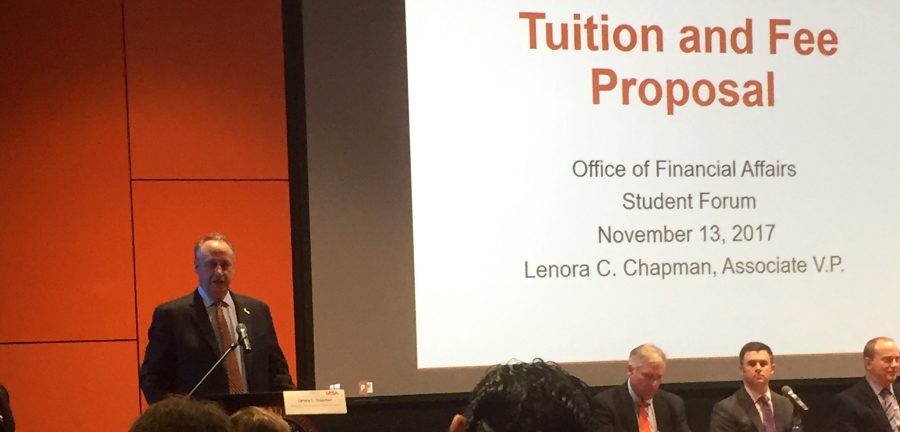UTSA’s Tuition and Fees Committee will soon send its proposal for a tuition increase to UTSA President Taylor Eighmy and then the UT System Board of Regents. With relatively no change in tuition and fees for the past six years, administrators felt it was time for a tuition hike.
The committee will submit two options as part of its tuition and fee proposal. The only difference between the options is the differential tuition charge for College of Engineering (COE) and College of Business (COB) students. Under the differential proposal, COB students would see an increase of $42 per semester credit hour (SCH) and COE students could experience an increase of $55 per SCH. The differential tuition rates would only be charged to students taking upper level courses in the COB and COE. Students earning a business minor would have to pay the differential tuition for their COB classes; there is no minor in the COE.
Also included in the proposal is an increase of $1 per SCH in the athletics fee, an increase of $1.50 per SCH for the automated service fee, a transportation fee increase of $9 and an increase in the student service fee of 39 cents per SCH.
Designated tuition could also experience increases as a part of the proposal. For in-state residents, tuition would increase $6.15 per SCH for undergraduates and $8.66 per SCH for graduate tuition rates. For non-Texas residents, the increases would be $27.73 per SCH for undergraduates and $33.33 for graduate students.
Earlier this year, Eighmy announced his initiatives to strategically plan his vision for the university. Included are plans to further renovate different parts of the university and hire faculty which will accelerate UTSA’s status as a top-tier institution. In achieving this goal, many administrators spoke about the need to increase the financial resources at UTSA, resulting in a Tuition and Fees Committee formation to examine the issue.
At the end of October, Eighmy presented outlined plans to research and advance UTSA’s sustainability and fiscal health. He appointed a 34-person Tuition and Fees Committee co-chaired by interim vice-provost and Vice President for Academic Affairs Mauli Agrawal and Vice President of Business Affairs Kathryn Funk-Baxter.
“The university is committed to the success of our students,” said Funk-Baxter. “Our tuition increase will be utilized to provide for the continuation of those efforts we have already started, to provide additional student aid as well as additional projects being identified by Dr. Eighmy’s presidential taskforce on student success.”
The committee itself is composed of student and faculty leaders from various colleges on campus. The committee was set to audit UTSA’s current tuition structure and look into various tuition plans, such as differential tuition and guaranteed-rate plans. Any change discussed in the committee would take place beginning Fall 2018.
One proposal for a tuition and fee increase came from the dean of the college of business, Dr. Gerry Sanders. Sanders wanted to fund four strategic initiatives: enhance course availability, enhance direct assistance to students, increase internship opportunities and create new active learning spaces. He called for a “differential” tuition rate for the College of Business students.
“It makes sense that the administration would want to raise rates for the College of Business students since we do have many resources,” said Angela Sanchez, graduate accounting student. “But at the same time, a large portion of UTSA students are business students. I think that with there being so many business students, the amount those students pay should cover most of the resources available to us.”
Another call for differential tuition came from Dr. JoAnn Browning, dean of the college of engineering. Browning noted the need for engineering to “spend more time in labs and the need for teaching and research technicians.”
The College of Engineering’s differential tuition rate would substitute the Tech and Instruction Support Fee.
“Logically it makes sense,” said freshman biomedical engineering student Jacob Garcia. “We cost the university more so we should pay more. However, I hope this does not deter future engineering students from pursuing the degree.”
Several other fee increases proposed over 2019 are the student service fees, athletic fees and transportation fees. The student services fee is currently split between student affairs and academic affairs, which total about $9.5 million in expenses. The student service fee does not cover all of the expenses, and UTSA pays for a portion of it out of a university reserve savings account.
The athletic fee increase was called to boost factors such as ticket sales initiatives, brand recognition, merchandising and cost-saving measures. The university believes it can increase the recognition of the university and, as a result, improve the recruitment of faculty, students and community outreach. UTSA’s athletic budget is currently the third from the bottom of the teams in Conference-USA West.
The transportation fee will cover the 33 buses and estimated 2.2 million riders of those buses service. Students currently pay $20 a semester for the transportation on and off-campus. An increase in this fee was previously proposed and supported by students; however, the proposal failed in the Board of Regents meeting and was not instituted.
“The increases could mean many things to students,” freshman cybersecurity major Luis Fraire said. “I think that it would be a huge setback for students who decided to pursue a higher education. Tuition is already high enough and the only thing keeping many of us here is financial aid, so an increase would surely affect our opportunity to enroll.”
The Student Government Association has already drafted resolutions showing their support of the increase in the student service fee, athletic fee, automated student service fee and transportation fee. However, the athletic and transportation fee are both subject to a student referendum, meaning they need student votes to be approved officially.
For further information about the options and examples of the charges for students, visit the Tuition and Fees Committee’s website at utsa.edu/financialaffairs/TuitionFees/proposals.html. Students can also contact their SGA representatives to voice their concerns about increases to tuition and fees.












